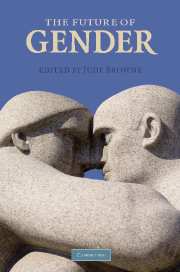Book contents
- Frontmatter
- Contents
- List of figures
- List of tables
- List of contributors
- Acknowledgements
- Introduction
- Part I Reorienting the feminist imagination
- Part II Variations on the theme of gender
- 4 Does biology play any role in sex differences in the mind?
- 5 Sex and the social construction of gender: can feminism and evolutionary psychology be reconciled?
- 6 ‘Trans’ trouble: trans-sexuality and the end of gender
- 7 Gender and social change
- 8 Procreative mothers (sexual difference) and child-free sisters (gender)
- Part III Gender and political practice
- Index
- References
6 - ‘Trans’ trouble: trans-sexuality and the end of gender
Published online by Cambridge University Press: 05 June 2012
- Frontmatter
- Contents
- List of figures
- List of tables
- List of contributors
- Acknowledgements
- Introduction
- Part I Reorienting the feminist imagination
- Part II Variations on the theme of gender
- 4 Does biology play any role in sex differences in the mind?
- 5 Sex and the social construction of gender: can feminism and evolutionary psychology be reconciled?
- 6 ‘Trans’ trouble: trans-sexuality and the end of gender
- 7 Gender and social change
- 8 Procreative mothers (sexual difference) and child-free sisters (gender)
- Part III Gender and political practice
- Index
- References
Summary
Current developments in trans-sexual technologies, and trans-gender identities, may seem marginal to the traditional concerns of ethics, and to mainstream moral issues. They are not. Ethics is concerned with the human person in relation to the good, as a matter of judgement and action (see, for example, Aristotle 2000, esp. Book I). Ethical discourses, as they are repetitively (yet variably) articulated in society, produce the human individual conceptually and socially as a physical and ethical subject. This is done through the construction of stereotypes (which are of course never fully realised by any one individual) and the elision of ‘difficult’ or ‘intermediate’ types (through marginalisation, erasure or ‘forgetting’). Any ethical subject also has a ‘constitutive outside’, a set of overt and contrasting categories and stereotypes through which ‘others’ are understood as different from the ethical subject itself (but without which the ethical subject is not fully intelligible). These may be human others, distinguished by age, sex, race/ethnicity, religion, language, class or any other set of markers, to which an ethical authority or discourse may appeal (see, for example, Aristotle 1996, esp. Books I–III). Or indeed these others may be animals, divinities or spirits (which resemble animals or humans in various ways), or mythological or cult entities of ambiguous status.
Ethical communication is not always dialogical in the sense of communication amongst moral persons who construe themselves as equals.
- Type
- Chapter
- Information
- The Future of Gender , pp. 116 - 135Publisher: Cambridge University PressPrint publication year: 2007
References
- 5
- Cited by

